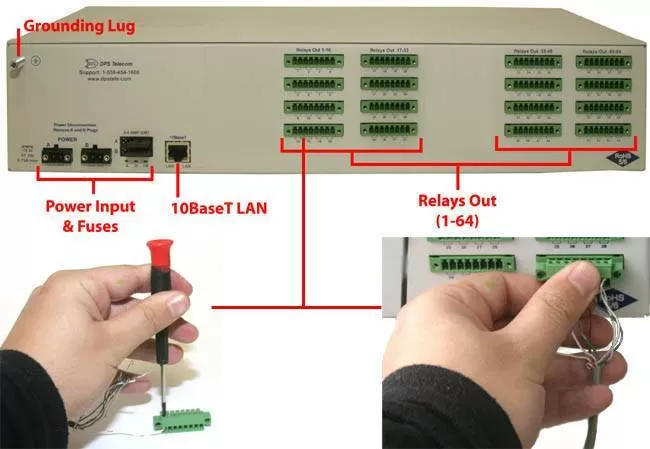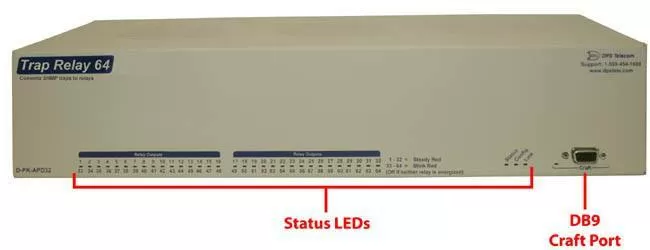Check out our White Paper Series!
A complete library of helpful advice and survival guides for every aspect of system monitoring and control.
1-800-693-0351
Have a specific question? Ask our team of expert engineers and get a specific answer!
Sign up for the next DPS Factory Training!

Whether you're new to our equipment or you've used it for years, DPS factory training is the best way to get more from your monitoring.
Reserve Your Seat Today
The Trap Relay provides a cost-effective and critical way to link inbound SNMP traps with a relay output. This device is the first of its kind from DPS. Typically, SNMP traps are forwarded from an RTU to an SNMP Manager.
This device will receive inbound SNMP traps and use this information to operate or release one of the device's controls relays. Traps received by the Trap Relay can be identified by either IP address, Trap ID, or by an additional variable binding.
In other words, the Trap Relay mediates contact closures (equipment alarms, doors, motion, water leaks...) and analog inputs (generator voltage, fuel gauge reading...) to SNMP traps.
So, whether you have a fire alarm control panel or any other piece of gear at your remote locations that only takes in contact closures, the Trap Relay device will fix this gap and translate SNMP to contact closures.
With the 64 relays, you'll be able to remotely control any device that you normally operate with a button or a switch. The relays will latch or release a contact closure based on the commands it receives. Relays are perfect for turning on small devices, opening doors, interfacing with legacy alarm systems, operating visual/audible notification systems, and rebooting jammed equipment.
The Trap Relay RTUs can be operated in one of two modes:
Granular mode
Allows the user to configure each relay to operate or release based on the enterprise, generic-trap, and specific-trap information of an SNMP v1 trap or the trap OID of an SNMP v2c trap.
Cisco-VMS mode
The unit will ignore each relay's SNMP trap configuration and will momentarily operate relays when it receivers either one of several VMS 6.3 SNMP Traps. A relay in Cisco-VMS mode will only operate if its description matches the VMS trap's mediaStreamName value.
If you have a specific device you want the Trap Relay to interface with, contact the engineers at DPS to have a specific model created just for you.
| Protocols: | HTTP, Telnet, ICMP, DCPx, SNMPv1, SNMPv2c. |
| Control Relays: | 32, 48, or 64 (pending build option). |
| Ping Targets: | 32 or 64 (depending build option). |
| Weight: | 3.5 lb. 3 oz. (1.6 kg). |
| Mounting: | 19" or 23" rack, 1 and 2 RU height (pending build option). |
| Power Input: | Dual Feed -48 VDC (-36 to -72 VDC). |
| Current Draw: | 250mA max for -48 VDC (idle 50mA). |
| GMT Fuse: | 3/4 Amp GMT Fuse. |
| Interfaces: | 1 RJ45 10BaseT half-duplex Ethernet port. 1 DB9 front-panel craft port. 16 pluggable alarm connectors OR 6 50-pin amphenol connectors. |
| Visual Interface: | 36 Front Panel LEDs. 5 Back Panel LEDs. |
| Operating Temperature: | 32-140 degrees F (0-60 C). |
| Operating Humidity: | 0%-95% noncondensing. |
| MTBF: | 60 years. |
| Windows Compatibility: | Windows XP, 2000, Vista, 7 32/64 bit. |
| RoHS 5 Approved | 5/6. |

| Control Relays: | 32 |
| Dimensions: | 3.47" H x 17.026" W x 7.336" D (8.81 cm x 43.25 cm x 18.63 cm) |
| Mounting: | 19" or 23" rack, 2 RU height |
| Power Input: | Dual Feed -48 VDC (-36 to -72 VDC) |
| Interfaces: | 1 RJ45 10BaseT half-duplex Ethernet port |
| Visual Interface: | 36 Front Panel LEDs |
| Operating Temperature: | 32-140 degrees F (0-60 C) |
| Operating Humidity: | 0%-95% noncondensing |
Note: This device requires a minimum order.
Trap Relay 64 - High Capacity Option

Trap 48RA - Medium Capacity Option with Audio Outputs

Trap Relay 32 Option
